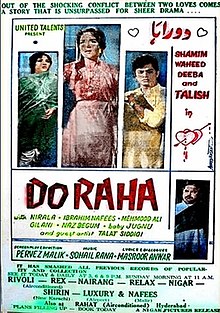| Doraha | |
|---|---|
 Film poster of Doraha Film poster of Doraha | |
| Directed by | Pervaiz Malik |
| Produced by | Sohail Rana Pervaiz Malik |
| Starring | Waheed Murad Shamim Ara Deeba Talish Ibrahim Nafees Nirala Talat Siddiqui |
| Music by | Sohail Rana |
| Production company | United Talents |
| Release date |
|
| Running time | 180 minutes |
| Country | Pakistan |
| Language | Urdu |
Doraha is a 1967 Pakistani musical romance film directed by Pervaiz Malik. It starred Waheed Murad and Shamim Ara, with Deeba, Talish and Ibrahim Nafees in the supporting cast. The film become remarkable due to its music, which was composed by Sohail Rana. It was co-produced by Malik and Rana under banner United Talents.
At the box office, the film failed to become a big hit, as it was expected, but it later gained more importance after several years, especially during the 1980s and 1990s due to its music and songs.
Plot
Doraha's plot focuses on the love story of two lovers and its tragic end. The plot centers on Naheed and Nadeem who love each other but couldn't get married due to Naheed's father who does not want to marry his daughter with a singer, as Nadeem used to sing on radio. Thus, he marries his daughter with another person which heartbreaks Nadeem. He thus moves to the hill station where he had first met Naheed. Another girl there loves Nadeem. She loves him so much that Nadeem gets annoyed by her. He decides to leave the place and go back. On the way, he gets robbed and starts to live there. He starts working in a construction company there. The owner of the company trusts him and provides him job owing to his ability. One day, the owner invites him to his marriage anniversary. He performs there but shocked to know that Naheed is his wife. Naheed blames him to which he goes from there leaving the function.
A man who has some problem with the owner, tries to kill the owner. Nadeem saves him but gets injured himself. When Naheed comes to hospital to thank the person who has saved her husband's life, shocked to see that Nadeem has saved his husband's life and by doing so he has gone blind. She requests to that girl who lives on the hill to take care of Nadeem.
Cast
- Waheed Murad as Nadeem
- Shamim Ara as Naheed
- Deeba
- Ibrahim Nafees
- Talish
- Nirala
- Talat Siddiqui
Release
The film was released by United Talents on 25 August 1967 on cinemas of Karachi and Lahore. During the same year, Doraha got tough competition from other successful films like Chakori, Lakhon Mein Aik, Darshan and Aag.
Music
The music of the film is composed by Sohail Rana. The songs of Doraha, particularly, Bhooli hui hoon daastan ... , Mujhe tum nazar se gira tau rahe ho ... Haan isi more par ... Tumhein kaise bata doon ... and Ajnabi zara souch lo ... became very popular on the Radio at that time. The evergreen songs of the film were written by Masroor Anwar and mostly sung by Ahmed Rushdi and Mala. Only one song was recorded in Mehdi Hassan's voice. Waheed Murad declared Rushdi's song, "Bhooli hui hoon daastan", his favorite song. The film Doraha proved to be a milestone in Ahmed Rushdi's career.
Track listing
- Tumhen Kaise Bata Doon by Ahmed Rushdi
- Bhooli Hui Hoon Daastan by Ahmed Rushdi
- Bhooli Hui Hoon Daastan by Ahmed Rushdi and Mala
- Mujhe Tum Nazar Se Gira Tau Rahe Ho by Mehdi Hassan
- Haan Isi Mor Par by Ahmed Rushdi
- Ajnabi Zara Souch Lo by Ahmed Rushdi
- Koi Mere Dil Mein by Mala
- Wafaaon Ka Badla by Mala
- Ae Chand Zara Ruk Jaana by Mala
The ghazal Mujhe Tum Nazar Se Gira Tau Rahe Ho was later covered by many singers including Ali Zafar.
References
- ^ "Doraha (film)". Complete Index To World Film (CITWF) website. 26 December 2015. Archived from the original on 27 December 2018. Retrieved 24 March 2022.
- ^ "Doraha (1967 film)". Pakistan Film Magazine website. 1 July 2016. Archived from the original on 25 August 2017. Retrieved 24 March 2022.
- Web Desk (23 November 2021). "Top five of Waheed Murad's evergreen movies". Bol News. Archived from the original on 24 February 2023.
- "A look at Mehdi Hassan's top 5 Ghazals on his fifth death anniversary". Dunya News. 13 June 2017. Retrieved 15 September 2024.